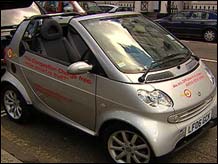Fuel efficiency and the need for more eco-friendly cars are key themes at the 77th Geneva International Motor Show, which opened on Thursday.
The event, which is expected to attract more than 700,000 visitors, features over 80 European and international vehicle premieres, including models from Russia and for the first time China.
Hybrid cars are a big theme at this year's show, as was the case last year. Many new cars at the show use alternative energy or alternative engines.
According to the organizers of the show, the development of new technologies was a major concern for car manufacturers facing global warming and tougher emission limits, and many big manufacturers are showing off their green credentials at this year's motor show.
Saab, for example, is presenting its BioPower 100 concept car that runs on pure bioethanol. Honda is unveiling a hybrid sports car, while Volkswagen is bringing its Passat BlueMotion.
"You will notice that it is no longer mainly the temple of power, performance at all costs, speed, or a form of gigantism, but a temple of new technologies, invented to take account of other constraints that are vital for the future of us all," said Luc Argand, president of the motor show.
more on this story











